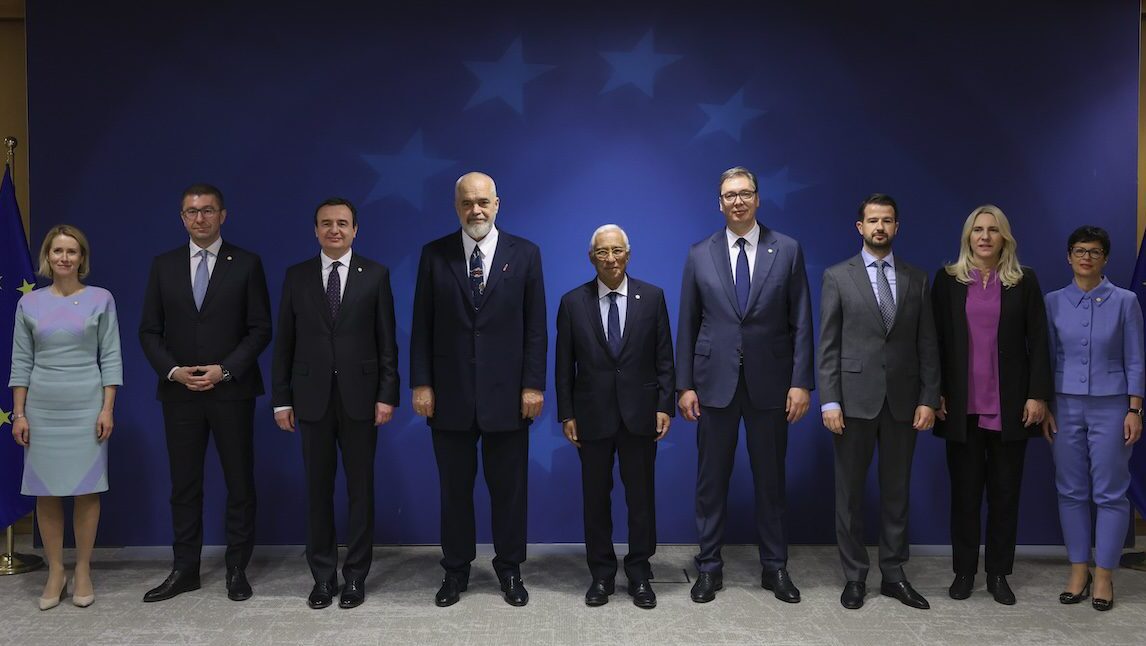
Leaders of the Western Balkan countries along with the EU’s High Representative for Foreign Affairs Kaja Kallas (far left), European Council President António Costa (center), and Enlargement Commissioner Marta Kos (far right).
Photo: European Council © European Union
The leaders of the six EU-aspirant Western Balkan countries—Serbia, Montenegro, North Macedonia, Albania, Kosovo, and Bosnia and Herzegovina—are meeting their EU counterparts as well as the heads of the European Council and Commission for their annual summit in Brussels on Wednesday, December 18th.
For the first time in many years, there is a genuine optimism in the air that at least some of them would be able to cross the finish line by the end of the decade, and before the second von der Leyen administration’s mandate expires.
During the last mandate, the general discussion about enlargement into the Western Balkans was characterized by a sense of stagnation. The Commission changed the rules of the accession process in 2020 by grouping the required reforms into thematic clusters that can only be opened for negotiation as a whole, after meeting certain preliminary benchmarks. Although this provided the candidate countries with a clearer roadmap to follow, it also set them back in the process.
This year, however, EU officials noted increased activity on both sides, with talks progressing steadily between Brussels and most of the Western Balkan countries. This gave hope to best-performing Montenegro and Albania to conclude the “neurotic” membership talks this decade, as the latter’s PM Edi Rama put it ahead of Wednesday’s summit.
The European Commission also expressed belief that at least a few of the Western Balkan candidates can join the bloc in the foreseeable future.
“We have a realistic prospect to bring one or more enlargement countries to the finish line during this Commission’s mandate,” the EU’s new Enlargement Commissioner, Slovenia’s Marta Kos said on Tuesday. She praised the newfound “dynamism” in EU expansion that can also be seen in the draft resolution the Council is expected to adopt this week.
Indeed, the resolution’s text shows a stronger-than-ever commitment to speed up the enlargement process, which became much needed “in the context of the radical change of the global geopolitical situation,” including the Ukraine war and the conflicts in the Middle East.
However, the geopolitical situation is not the only reason the Western Balkans are finally making leaps toward realizing their long-term dream.
The other is the relentless work of the Hungarian Council presidency, which treated the accession process of these countries as a top priority during the six-month mandate now nearing its end. “More has happened in the past two months than in the last 15 years,” Hungarian Foreign Minister Péter Szijjártó said on Tuesday.
“All this is happening thanks to the Hungarian presidency,” Rama agreed, but the Albanian PM is not the only one who acknowledged Budapest’s efforts, even if reluctantly. The presidency “did the job” conceded Socialist MEP Nacho Sánchez Amor on Tuesday when talking to Politico, although he quickly added that there was also great “appetite” in Brussels for moving forward.
🇦🇱🤝🇭🇺 FM Péter Szijjártó: Albania applied for EU membership 15 years ago, and it is under the #HU24EU presidency that substantial accession talks have finally begun.
— Zoltan Kovacs (@zoltanspox) December 17, 2024
🇭🇺🇪🇺 The @HU24EU presidency is delivering results: a second group of negotiation chapters will now be… pic.twitter.com/8bA7YuSiKy
The war in Ukraine, however, did not help in the case of Serbia, whose accession hit a roadblock this year over Belgrade’s refusal to join the EU sanctions against Russia, as well as what Brussels perceives as an erosion of democracy under Aleksandar Vučić’s sovereigntist government, a close ally of Orbán’s Hungary.
The EU is perhaps waiting for the 2027 parliamentary elections in Serbia, hoping that Vučić’s liberal opposition will prevail this time. But Brussels needs to prepare to make concessions even if it doesn’t, as no enlargement can be complete without the inclusion of the largest Western Balkan country—a country that’s also invaluable in the fight against illegal migration.
As for enlargement in the east, speeding up Ukraine’s accession process will be a priority of the incoming Polish Council presidency that’s set to take over in January. The outcome of that, of course, largely depends on whether there would be a ceasefire agreement next year (with Trump in the White House) and on what specific terms.
